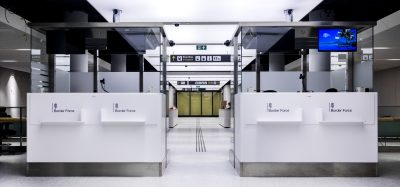Eurostar to introduce new technology to enable contactless journeys
Posted: 19 June 2020 | Global Railway Review | No comments yet
A facial biometric corridor will be introduced at St. Pancras International that will enable a digital and contactless journey for Eurostar passengers.


Credit: iProov
Rail passengers using Eurostar services will be the first to take advantage of a facial biometric corridor that will enable contactless journeys. The walk-through system will allow customers to complete ticket checks and border exit processes at St. Pancras International Station without needing to come into contact with people or hardware.
The concept – which has already been trialled in airports to increase speed and safety and manage immigration – is now being brought to train travel as part of the First of a Kind (FOAK) competition run by Innovate UK and funded by the Department for Transport (DfT). The initiative supports research, development and innovation in the UK rail industry.
The UK Transport Secretary, Grant Shapps, said: “I am delighted to announce the winners of this year’s First of a Kind competition, which will support better, more environmentally friendly journeys. Crucially, these pioneering projects will also ensure that passengers have a more efficient, reliable and responsive railway, making their journeys simpler and easier.”
Ian Campbell, Executive Chair of Innovate UK, said: “These high quality projects illustrate the appetite of UK organisations to develop new and exciting innovations for rail transport that improve customers’ user experience, that optimise railway efficiency, and are environmentally sustainable.”
Passengers planning to travel on Eurostar services would be offered an accelerated pre-boarding option. Prior to travelling, they would use the Eurostar app to scan their identity documentation and then conduct a facial biometric check, which uses patented controlled illumination to authenticate the identity of the user against the ID document. A kiosk solution at the station would allow passengers without access to smartphones to complete the same process.
The solution, developed by iProov, is unique in assuring the genuine presence of the passenger. As well as checking that the user is the right person – matching the identity portrayed in the passport – the illumination process checks that the user is a real person (rather than a photo, video or mask). This protects against large-scale criminal attacks using deepfakes.
The passenger would then receive a message confirming that their identity document had been secured and a ticket or passport would not need to be shown again until they reached their destination. On arrival at St Pancras International, the passenger would enter the contactless travel corridor and proceed in a socially-distanced fashion before boarding the train.
Strategy Director and Company Secretary at Eurostar, Gareth Williams, said: “We are very pleased to be working with iProov on this important innovation. We’re convinced it will enhance our passenger experience and offer a live illustration of how innovation can benefit the high speed rail and international transport industries.”
Andrew Bud, Founder and CEO of iProov, said; “This is a world first. iProov is enabling train passengers to choose to travel without tickets or documentation in a way that is safe and secure. What started off as a project to reduce travel congestion and keep passengers moving is now going to help keep people safe in a pandemic world through social distancing and contactless interaction. It’s yet another example of how opt-in facial verification is making life easier and safer for people around the world.”
Related topics
Coronavirus/COVID-19, Digitalisation, Passenger Experience/Satisfaction, Security & Crime Management, Smart/Contactless Ticketing, Technology & Software
Related organisations
Department for Transport (DfT), Eurostar, Innovate UK, iProov








